That night seemed to drag on forever. We didn’t sleep much. The heat was brutal, still above 40ºC, and I had to keep my bed wet by splashing myself with lukewarm drinking water from a bottle, in a futile search for some coolness. The air mattress felt spongy and wobbly. We tossed and turned and heard noises, and were up very early. After packing up unsteadily, 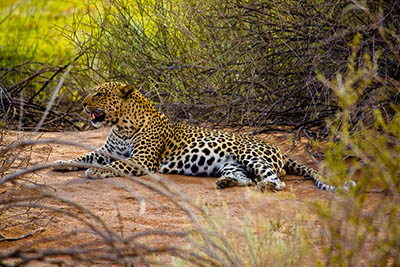 we took welcomed showers. Others were doing the same. In the Kgalagadi, nobody sleeps in. Dawn and dusk are the fleeting but priceless gems of any given day.
we took welcomed showers. Others were doing the same. In the Kgalagadi, nobody sleeps in. Dawn and dusk are the fleeting but priceless gems of any given day.
We faced an easy drive to Nossob, some 80 kilometers to the north, far inside the park. It is a major intersection between two sand “roads” and the hub was said to have a store, gas station and available accommodation. We decided to get a proper room there instead of a campsite, in hopes of a better night.
Our Park permit and log was retrieved from the main gate where a ranger duly recorded our new destination; failure on our part to later surrender said log in Nossob would trigger a search. The 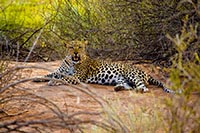 Park Administration didn’t want us eaten. It’s bad publicity.
Park Administration didn’t want us eaten. It’s bad publicity.
We topped up our diesel tank and headed out the secondary gate that acts as a damper between the actual reserve and the inhabited compound. Still sleepy, I was fiddling with my camera in the left seat while Marie was driving us slowly on the shallow sand path, her eyes trained on the bushes, ready for anything.
Suddenly, less than 300 meters from the gate, she hissed: “Look!”
I jerked my head up but at first could not see what she was pointing at. “Jislaaik!” she said again, her voice unbelieving, “It’s a freakin’… leopard!”  And I finally saw it. The stunningly beautiful animal was right by the side of the road, oblivious to us, stalking a herd of wildebeest and their two calves.
And I finally saw it. The stunningly beautiful animal was right by the side of the road, oblivious to us, stalking a herd of wildebeest and their two calves.
Marie maneuvered us to a stop and I quickly aimed my camera, took a few shots, and sat back down. “Cool,” I said, satisfied. She looked at me with incredulous eyes. “Cool? That’s it? Do you realize how lucky we are? This is exceptional!” “Yeah,” I agreed, “it’s amazing!” I was happy and ready to move on to our next sighting. For all I knew – being a game reserve neophyte – the entire day was going to be a long series of stops to photograph animals like we would in a zoo.
Marie patiently explained that the odds of spotting a leopard so soon and 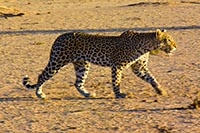 so close to the gate were very slim – next to none, as it would turn out from many later conversations with ex-park visitors. These were wild animals and they were spread out throughout the entire area of the park. “And this is,” she added, “a perfect sighting: no other cars around, the animal is 30 meters away, on the move and hunting.” I decided that a perfect sighting deserved more pictures and figured that I could get a much clearer shot by opening the electric roof and standing up on my seat, which I did.
so close to the gate were very slim – next to none, as it would turn out from many later conversations with ex-park visitors. These were wild animals and they were spread out throughout the entire area of the park. “And this is,” she added, “a perfect sighting: no other cars around, the animal is 30 meters away, on the move and hunting.” I decided that a perfect sighting deserved more pictures and figured that I could get a much clearer shot by opening the electric roof and standing up on my seat, which I did.
The leopard continued to ignore us but we must have blown its cover. Our presence seemed to bother the wildebeest and they moved away from the road and their stalker. The 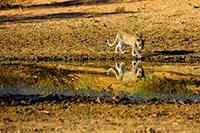 feline appeared to take this blow casually and lay down for a while, panting softly as if tasting the air. Then it got up again and started after its prey, away from us.
feline appeared to take this blow casually and lay down for a while, panting softly as if tasting the air. Then it got up again and started after its prey, away from us.
We got back on the road, very excited. “Poor gnous,” I said to Marie, “their young would make such a delicious breakfast for the leopard.”
“Poor what?” she asked surprised.
“Gnous. It’s the French word for wildebeest.” She suddenly laughed. “Now I understand,” she said, and she sang something to herself that sounded like “I’m a guh-nooo…” I looked at her concerned. The heat of the previous night might have taken a deeper toll than I’d realized. “It’s from the Muppets,” she explained with a wide smile. “Ah,” I answered. I am not Muppet-literate. No 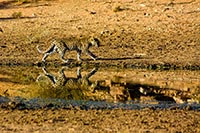 one is perfect. But the phrase was catchy and it would stick with us for the rest of the trip.
one is perfect. But the phrase was catchy and it would stick with us for the rest of the trip.
Some ten minutes later, having already spotted many kinds of antelopes, squirrels and other peaceful animals, we came upon a group of SUV’s piled up against each other at bizarre angles, effectively blocking the way. Drivers and passengers were pointing all kinds of cameras towards the left. Some had huge telephoto lenses that instantly made me jealous.
It took us a moment to figure out what they were staring at. Then we made out the shape of another leopard, lying in the shade of a tree. It was hard to see 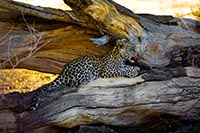 because of all the cars, five or six of them, each one trying to get a better view, a cleaner shot. It appeared there was no code of ethics among game watchers. The jungle law applied to people too. First come, first served, and if you could cut off the guy in front of you, you would.
because of all the cars, five or six of them, each one trying to get a better view, a cleaner shot. It appeared there was no code of ethics among game watchers. The jungle law applied to people too. First come, first served, and if you could cut off the guy in front of you, you would.
It was disappointing and we moved on, joking about how much nicer our own private sighting had been. A little bit further, once again, a couple of cars roughly parked on the side of the path slowed us down, and as it was going to be the case every time we passed a 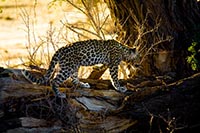 stopped vehicle, we followed the gaze of the occupants. Then Marie and I looked at each other, incredulous. There, sitting alone in the middle of a wide open space in the dried river bed, was a leopard cub.
stopped vehicle, we followed the gaze of the occupants. Then Marie and I looked at each other, incredulous. There, sitting alone in the middle of a wide open space in the dried river bed, was a leopard cub.
It had a patient and resigned attitude but was far from asleep and rather watchful, and something about its gaze smelled of underlying resolve and pride, as if it had known that its lineage was great and a day would come when it would rule over this land. We wondered if the first leopard we’d seen might have been the mother, gone hunting and having left the cub behind near a waterhole.
Everywhere in Africa, life revolves around the variable presence of waterholes. In the Kgalagadi, these are mostly located along the desiccated beds of the two rivers and because of 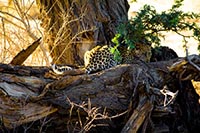 the incredible dryness, some of the holes have been supplemented with artificial wind-driven wells that manage to pump a miserable amount of water up from the water table below, attracting animal life in a bi-daily cycle.
the incredible dryness, some of the holes have been supplemented with artificial wind-driven wells that manage to pump a miserable amount of water up from the water table below, attracting animal life in a bi-daily cycle.
At first, childishly enthusiastic, we kept a list of each species we spotted and their numbers. Eventually, though, after counting dozens or even hundreds of springbok, wildebeest, hartebeest, gemsbok (oryx) and other common animals, we stopped. There were many kinds of birds of prey and also the incredibly sized kori bustards. There were cute mongooses. There were ground squirrels, blue-headed lizards and black-backed jackals.
Less 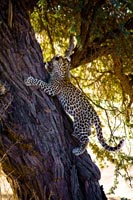 than an hour before arriving in Nossob, we finally spotted a lion near a waterhole, already walking away towards the shade of some distant trees. A couple parked there told us that there had been three of them, young males, lying right next to the road. We decided to come back in the evening.
than an hour before arriving in Nossob, we finally spotted a lion near a waterhole, already walking away towards the shade of some distant trees. A couple parked there told us that there had been three of them, young males, lying right next to the road. We decided to come back in the evening.
Nossob, too, was protected by a gated high fence. It was a medium size enclosure in which seven or eight bungalows cohabited with the office/info center/store/gas station. While waiting for our key, I glanced at a large sign by the registration desk labeled “Wall of shame”. On it were posted pictures of unknowing visitors that had broken the sacred Park Rules and were hence used to illustrate the do’s and don’t’s of proper game watching.
I thought the photos of cars parked across the road or into the 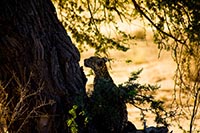 bushes were funny, and so were the ones showing people venturing out of their cars. Then I came upon one of a dude sticking out of his car roof to take a picture of nearby lions. The legend said: “A lion can run towards you at 6 meters per second. How fast do you really think you can roll that window up or slide down inside your car and close the roof?” I showed it to Marie, embarrassed, and re-read the back of our permit. It was clearly mentioned that no body parts were allowed outside of cars. Le visiteur jura, mais un peu tard, qu’on ne l’y prendrait plus.
bushes were funny, and so were the ones showing people venturing out of their cars. Then I came upon one of a dude sticking out of his car roof to take a picture of nearby lions. The legend said: “A lion can run towards you at 6 meters per second. How fast do you really think you can roll that window up or slide down inside your car and close the roof?” I showed it to Marie, embarrassed, and re-read the back of our permit. It was clearly mentioned that no body parts were allowed outside of cars. Le visiteur jura, mais un peu tard, qu’on ne l’y prendrait plus.
We settled in our own bungalow with delight and prepared for a night of grand comfort. It was still early and we agreed that after offloading and resting for a while, we’d 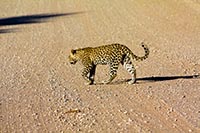 drive back out to the last waterhole and wait for the lions to show up – with no body parts sticking out.
drive back out to the last waterhole and wait for the lions to show up – with no body parts sticking out.
The gates of Nossob close early. By 7:30 pm, everyone must be inside, or else. A sign by the gate warns visitors of a jackal problem within the compound and reminds them not to leave anything outside, food, shoes, toes and the like. But it’s a small inconvenience in comparison to the popular stories of visitors killed by felines in other unprotected areas, stories that people tell and re-tell with the chronic fascination of horror movie watchers.
By 6:00 pm, we were arriving at the waterhole. We first scanned the distant tree line but found the lions almost at our feet – all three of them lying low in the grass, resting, waiting for the heat to dissipate. The waterhole was deserted, probably because of their 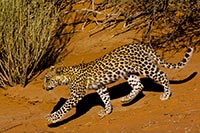 presence. Well, not quite completely deserted; a solitary jackal was circling on the opposite side, unable to bring itself to close in beyond a safe distance but wanting a turn to go drink.
presence. Well, not quite completely deserted; a solitary jackal was circling on the opposite side, unable to bring itself to close in beyond a safe distance but wanting a turn to go drink.
Eventually, we had to head back in order not to miss the closing of the gate. An enormous storm cloud was hovering on the horizon and, like any respectable cumulonimbus, was dropping considerable amounts of water on the scenery below. We watched, fascinated, as the giant dark cloud moved in our direction. We were in for a treat. Rain in the Kgalagadi is precious and rare.
Back at the compound, we started the braai 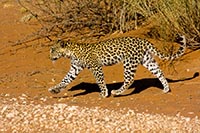 as darkness fell fast, and by the time we put the boerewors on the fire, large raindrops were splashing on our faces. We retreated underneath the relative protection of a narrow corrugated iron canopy and watched lightning illuminate the night. It rained for over an hour. At 11:00 pm, electricity was shut down throughout the compound like every night and we continued on with candles and headlamps.
as darkness fell fast, and by the time we put the boerewors on the fire, large raindrops were splashing on our faces. We retreated underneath the relative protection of a narrow corrugated iron canopy and watched lightning illuminate the night. It rained for over an hour. At 11:00 pm, electricity was shut down throughout the compound like every night and we continued on with candles and headlamps.
In the morning there were puddles at the bottom of each depression in the road. We headed west across the park, traversing from one riverbed to the other over desolate dunes and into a very different landscape. Gemsbock 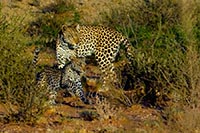 were drinking in the puddles right on the road. We spotted a few snakes, including a dreadful Cape cobra, bright yellow and a meter long. The advertised giraffes, however, never materialized. But we found a solitary brown hyena and later a couple of lions resting under a tree near the open carcass of a wildebeest they had killed and dragged almost 100 meters across the road.
were drinking in the puddles right on the road. We spotted a few snakes, including a dreadful Cape cobra, bright yellow and a meter long. The advertised giraffes, however, never materialized. But we found a solitary brown hyena and later a couple of lions resting under a tree near the open carcass of a wildebeest they had killed and dragged almost 100 meters across the road.
When we reached Twee Rivieren, closing our loop around the southern part of the park, we again opted for a bungalow. This being the main compound, we would now have air conditioning in our 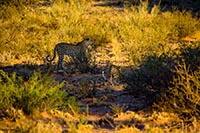 room, a luxury so great I could barely imagine it. We moved in, unpacked and took a nap. Later we went back out for a drive into the closest portion of the road to Nossob, hoping to see a leopard again. We did better than that. We saw the mother leopard involved in a mysterious hunt along with four cheetahs, a Cape fox and a steenbok. Mother nature was orchestrating her dramas with a flair that, while perfectly clear for the animals, kept us guessing and puzzled.
room, a luxury so great I could barely imagine it. We moved in, unpacked and took a nap. Later we went back out for a drive into the closest portion of the road to Nossob, hoping to see a leopard again. We did better than that. We saw the mother leopard involved in a mysterious hunt along with four cheetahs, a Cape fox and a steenbok. Mother nature was orchestrating her dramas with a flair that, while perfectly clear for the animals, kept us guessing and puzzled.
When we got back to the two-room bungalow, I went into the bedroom that we had left closed because it contained the AC unit, shut the door behind me and turned on the light. 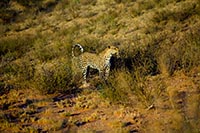 A small shape flew by my head in a whoosh. I looked up, surprised. Two bats were flying in circles above me. This was a high ceiling and they quickly disappeared underneath one of the wooden beams. I frowned and looked at the bed. There were droppings everywhere, and bat droppings are known to be a rather serious health hazard. “Zut,” I said to myself, “I guess we won’t have AC tonight after all.”
A small shape flew by my head in a whoosh. I looked up, surprised. Two bats were flying in circles above me. This was a high ceiling and they quickly disappeared underneath one of the wooden beams. I frowned and looked at the bed. There were droppings everywhere, and bat droppings are known to be a rather serious health hazard. “Zut,” I said to myself, “I guess we won’t have AC tonight after all.”
I went back and broke the news to Marie. There were two additional beds in the kitchen section of the bungalow and despite the relative distance from the AC unit, they were clean and would have to do. “This is Africa, after all,” I philosophized hypocritically to Marie, being the visitor myself and her the local. For that reason, I opted not to show or even mention 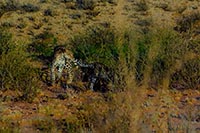 the giant spider-like creature I found in the shower – body almost the size of my fist and legs everywhere. It was slow and lazy and resisted only mildly my forceful eviction through the window, but revealed, it might have been the drop that made the vase overflow.
the giant spider-like creature I found in the shower – body almost the size of my fist and legs everywhere. It was slow and lazy and resisted only mildly my forceful eviction through the window, but revealed, it might have been the drop that made the vase overflow.
In the morning, we got up at dawn and even before packing, went for an early last drive. We were blessed with another lion and a marvelous sighting of the same leopard cub walking straight to us to come and drink at a waterhole and then eventually walking back next to the Landcruiser and climbing into a tree.
It was the apotheosis. We left the park happy and drove south onto a new route. We were headed back to civilization. Or so we thought…
«Roasted in the Namib» Series
Want to read the entire series of stories? Start here
Already reading sequentially?
Previous story: Roasted in the Namib, Part 5 – Sweating it in Keetmanshoop
Next story: Roasted in the Namib, Part 7 – Back to so-called civilization
Marie’s recount: Namibia
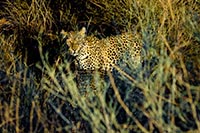
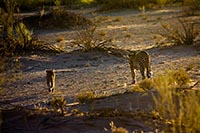
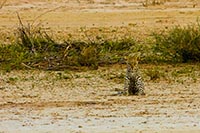
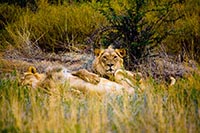
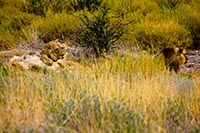
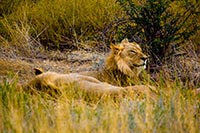
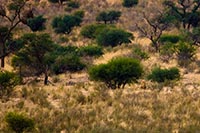
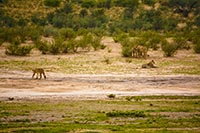
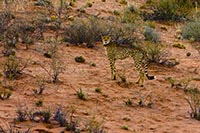
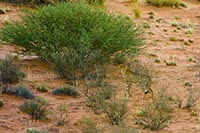
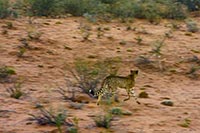
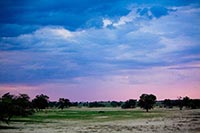
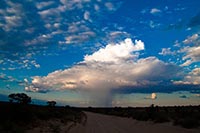
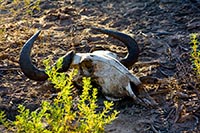
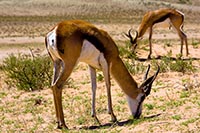
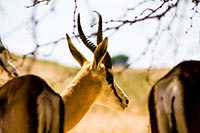
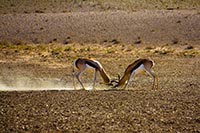
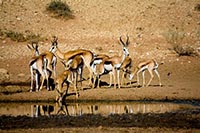
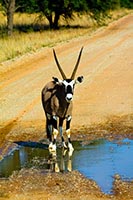
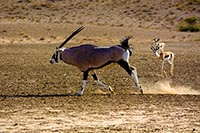
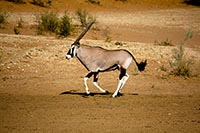
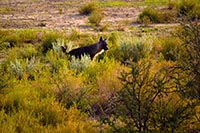
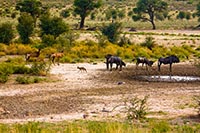
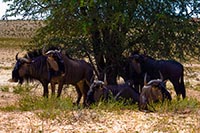
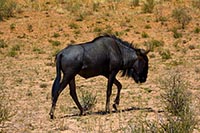
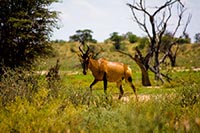
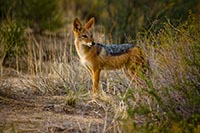
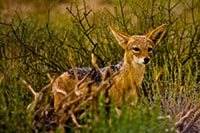
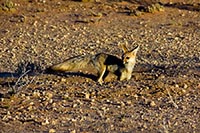
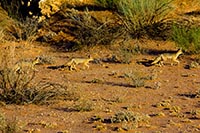
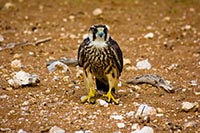
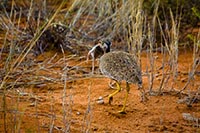
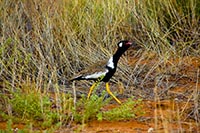
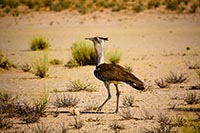
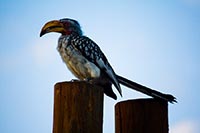
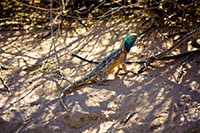
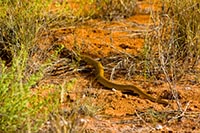
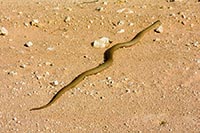
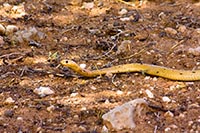
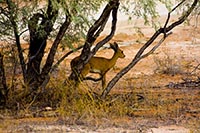
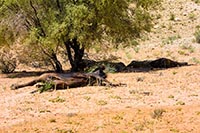
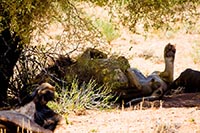
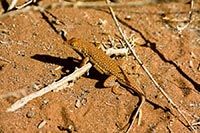
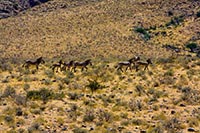
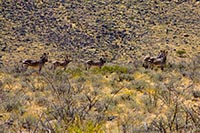
Comments
Vince
Marie
Vince
Jay and Guy
Elo
Vince